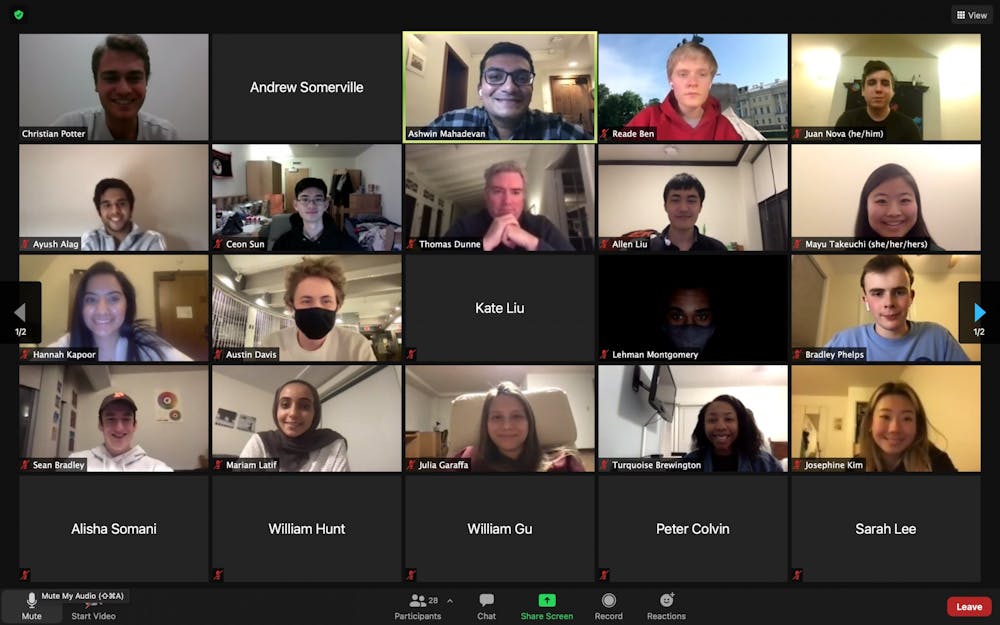The University recently announced that sworn Department of Public Safety (DPS) officers will begin wearing body cameras at all times starting later this spring. At this week's Undergraduate Student Government (USG) Senate meeting, representatives from DPS presented on the policy.
Sergeant Sean Ryder explained to the Senate that the policy follows two bills signed into law mandating the measure. The policy will be implemented beginning in April, and all required officers will be trained by June.
After DPS representatives presented on the Body Worn Camera Policy, they opened the floor for questions.
Academics chair Austin Davis ’23 asked about the possibility of officer non-compliance, meaning officers' potential failure to turn on their cameras when necessary.
“Failure to follow this policy is a violation of University rules,” said DPS Director of Operations Kenneth Strother. “[The officer] will be subject to University discipline.”
Chair of the Sustainability Committee Mayu Takeuchi ’23 asked about the role of USG in the adoption of officer body camera technology.
“We want people to understand that we are using this technology,” Strother said. “And we want USG to be a continued partner with DPS. If you have any questions or concerns, please ask us.”
Bradley Phelps ’22, a senator for the Class of 2022, asked about guidelines concerning recording during student protests or demonstrations.
“[At protests] we’re trying to make sure there isn’t any external force that impedes [students'] ability to demonstrate or protest,” Strother explained. “There is a balance between making sure that we capture police action without just recording students exhibiting their First Amendment rights.”
Strother also emphasized the observable difference between sworn and non-sworn security officers. DPS employs about 39 sworn officers in total.
“Our sworn officers wear all-black uniforms with the Princeton orange stripe on the pant leg,” he noted.
The USG Senate also discussed the launch of its Tigers in Town initiative. Over spring break, USG launched its first program using the initiative. Social Committee chair Lehman Montgomery ’22 presented data from the first USG-sponsored event to the Senate.

“Items that were less than $5 only garnered about 70 percent attendance, whereas more expensive items — around $10-15 — had higher turnout,” he said.
The event also operated below its budget, according to Montgomery.
During his weekly report, USG president Christian Potter ’22 gave an update on the Spring Social Engagement Survey, which received 635 responses over 11 days.
Using the collected data, the Senate will release a report summarizing survey results and their plans for social programming for the rest of this semester.
“We want to make sure that the student body knows that the responses that they gave matter,” Potter said.
The Senate also approved the appointment of Britton Masback ’24 to elections chair, a new and non-voting position. Masback was confirmed unanimously.
Leader of the Mental Health Task Force Allen Liu ’22 submitted a request for funds for the Tigers Helping Tigers program, a series of training sessions that teach student leaders “how to identify signs of distress in peers.”
The unanimously approved request was directed to funding an event sponsored by Tigers in Town. Those who attended a Tigers Helping Tigers session were allocated one free meal from Fresca Bowls or Jammin’ Crepes and a free drink from Ficus, with an allocation of $20 per person. There were 80 people in attendance.
This $1,600 in Tigers Helping Tigers funding comes from the USG budget as a general funding allocation.
Senate meetings — open to all members of the undergraduate student body — occur via Zoom at 8:30 p.m. ET each Sunday. The link to join the meeting can be found in the weekly USG newsletter, which is sent to all undergraduate students.








